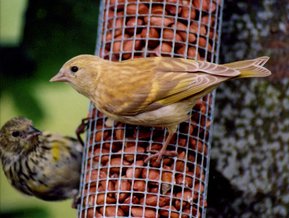
Last winter was a trial for us all, and our garden birds did not have an easy
time of it either. The British Trust for Ornithology's (BTO) Garden Bird Feeding
Survey saw unprecedented numbers of birds driven into Britain's gardens in
search of food. As winter looms once again, an army of 'citizen scientists' is preparing to chart the changing fortunes of our winter visitors.
The combination of poor fruit and seed yields in the wider countryside last
autumn, and the long, cold winter that followed, brought unprecedented numbers
of birds to our gardens. Perhaps the most striking arrival was the number of Siskins visiting gardens in search of food — numbers last winter were more than double the previous five-year average — a response to very poor crops of Sitka Spruce and birch seed, which Siskins usually take in winter.
While the stories emerging from individual winters are fascinating, it is the
quantity of information collected by the BTO's armchair birdwatchers since 1970
that has proved so important. These long-term changes hint at what the future
might hold for our gardens and their visiting bird communities. Garden
birdwatchers may be seeing less of 'common' species, such as Collared Dove, Song Thrush and Starling, which are disappearing from our gardens
quite rapidly. However, fortunes for other birds are improving with Bullfinch, Goldfinch and Great Spotted Woodpecker becoming regulars.
As the nation hopes that this winter is not as long or cold as the last one,
a certain group of birdwatchers are probably in two minds. For those who
participate in the BTO's Garden Bird Feeding Survey (GBFS), it is time to dust
off their notebooks and start recording from the warmth of their living
rooms.
Clare Simm of the BTO Garden Ecology team shares her thoughts as to what may
happen this winter: "With an unusually late start to the breeding season this
year, and a slow move towards the warm weather, it is difficult to predict
exactly how our birds will be faring as they enter the winter months. If this
winter is anywhere near as cold as last, then we might expect a sudden influx
into gardens once the autumn seed and berry stocks are depleted. One thing is
for sure, our 'citizen scientists' will be the first to notice and tell us."
For a free guide on what to feed your birds this winter, information on how
to become a citizen scientist with the BTO and the opportunity to contribute to
valuable work like this, email [email protected],
telephone 01842 750050 or write to GBFS, BTO, The Nunnery, Thetford, Norfolk,
IP24 2PU.
time of it either. The British Trust for Ornithology's (BTO) Garden Bird Feeding
Survey saw unprecedented numbers of birds driven into Britain's gardens in
search of food. As winter looms once again, an army of 'citizen scientists' is preparing to chart the changing fortunes of our winter visitors.
The combination of poor fruit and seed yields in the wider countryside last
autumn, and the long, cold winter that followed, brought unprecedented numbers
of birds to our gardens. Perhaps the most striking arrival was the number of Siskins visiting gardens in search of food — numbers last winter were more than double the previous five-year average — a response to very poor crops of Sitka Spruce and birch seed, which Siskins usually take in winter.
While the stories emerging from individual winters are fascinating, it is the
quantity of information collected by the BTO's armchair birdwatchers since 1970
that has proved so important. These long-term changes hint at what the future
might hold for our gardens and their visiting bird communities. Garden
birdwatchers may be seeing less of 'common' species, such as Collared Dove, Song Thrush and Starling, which are disappearing from our gardens
quite rapidly. However, fortunes for other birds are improving with Bullfinch, Goldfinch and Great Spotted Woodpecker becoming regulars.
As the nation hopes that this winter is not as long or cold as the last one,
a certain group of birdwatchers are probably in two minds. For those who
participate in the BTO's Garden Bird Feeding Survey (GBFS), it is time to dust
off their notebooks and start recording from the warmth of their living
rooms.
Clare Simm of the BTO Garden Ecology team shares her thoughts as to what may
happen this winter: "With an unusually late start to the breeding season this
year, and a slow move towards the warm weather, it is difficult to predict
exactly how our birds will be faring as they enter the winter months. If this
winter is anywhere near as cold as last, then we might expect a sudden influx
into gardens once the autumn seed and berry stocks are depleted. One thing is
for sure, our 'citizen scientists' will be the first to notice and tell us."
For a free guide on what to feed your birds this winter, information on how
to become a citizen scientist with the BTO and the opportunity to contribute to
valuable work like this, email [email protected],
telephone 01842 750050 or write to GBFS, BTO, The Nunnery, Thetford, Norfolk,
IP24 2PU.
 RSS Feed
RSS Feed